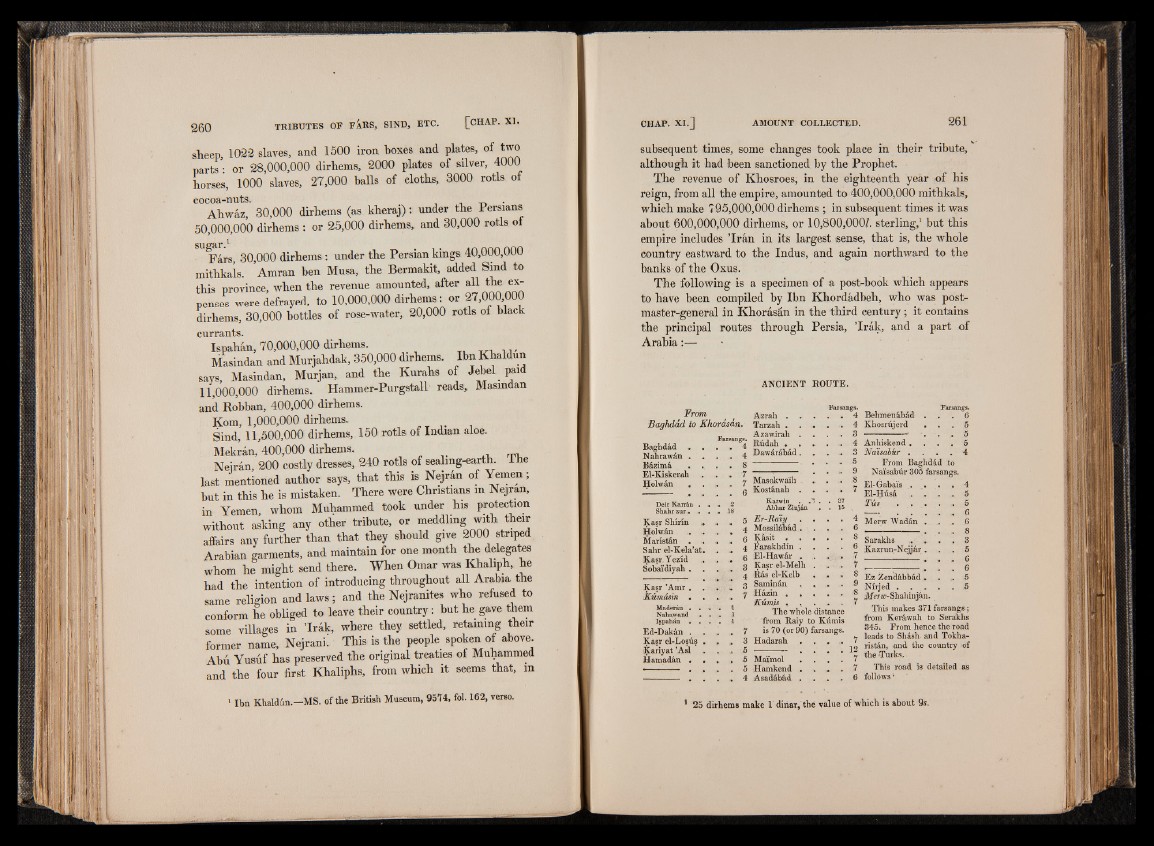
sheep, 1022 slaves, and 1500 iron boxes and plates, of two
parts - or 28,000,000 dirhems, 2000 plates of silver, 4000
horses, 1000 slaves, 27,000 balls of cloths, 3000 rotls of
cocoa-nuts.
Ahwaz, 30,000 dirhems (as kheraj) I under the Persians
50,000,000 dirhems : or 25,000 dirhems, and 30,000 rotls of
Fars, 30,000 dirhems: under the Persian kings 40,000,000
mithkals. Amran ben Musa, the Bermakit, added Sind to
this province, when the revenue amounted, after all the expenses
were defrayed, to 10,000,000 dirhems: or 27,000,000
dirhems, 30,000 bottles of rose-water, 20,000 rotls of black
currants.
Ispahan, 70,000,000 dirhems.
Masindan and Murjahdak, 350,000 dirhems. Ibn Khaldun
says, Masindan, Murjan, and the Kurahs of Jebel_ paid
11,000,000 dirhems. Hammer-Purgstall- reads, Masindan
and Robban, 400,000 dirhems.
Kom, 1,000,000 dirhems.
Sind, 11,500,000 dirhems, 150 rotls of Indian aloe.
Mekran, 400,000 dirhems. . ,
Nejran 200 costly dresses, 240 rotls of seahng-earth. lh e
last mentioned author says, that this is Nejran of Yemen;
but in this he is mistaken. There were Christians m Nejran,
in Yemen whom Muhammed took under his protection
without asking any other tribute, or meddling with their
affairs any further than that they should give 2000 striped
Arabian garments, and maintain for one month the delegates
whom he might send there. When Omar was Khaliph, he
had the intention of introducing throughout all Arabia the
same religion and laws; and the Nejranites who refused to
conform he obliged to leave their country: but he gave them
some villages in ’Irak, where they settled, retaining their
former name, Nejrani. This is the people spoken of above.
Abu Yusuf has preserved the original treaties of Muhammed
anH the four first Khaliphs, from which it seems that, in
1 Ibn Khaldun—MS. of the British Museum, 9574, fol. 162, verso.
subsequent times, some changes took place in their tribute,
although it had been sanctioned by the Prophet.
The revenue of Khosroes, in the eighteenth year of his
reign, from all the empire, amounted to 400,000,000 mithkals,
which make 795,000,000 dirhems ; in subsequent times it was
about 600,000,000 dirhems, or 10,800,000/. sterling,1 but this
empire includes Tran in its largest sense, that is, the whole
country eastward to the Indus, and again northward to the
banks of the Oxus.
The following is a specimen of a post-book which appears
to have been compiled by Ibn Khordadbeh, who was postmaster
general in Khorasan in the third century; it contains
the principal routes through Persia, ’Irak, and a part of
Arabia:—
ANCIENT ROUTE.
From
Baghdad, to Khorasan.
Farsangs.
Baghdad
Nahrawân .
Bâzimâ
El-KÌskerah
Holwân .
Deir Karràu .
Shahr zur . .
Kasr Shirin
Holwân .. .
Maristân
Salir el-Kela’at
Kasr Yezld
Sobaïdiyah .
Kasr ’Amr .
Kümâsin |
Maderàn . .
Naliawand •
Ispaluin * «
Ed-Dakân .
Kasr el-Losûs
Kariyat ’Asl
Hamadân •
Farsangs. , 4
I 4
. 8
> '7
. 7
. 6
Tarzah | 4
Azawirah . .3
Rudah . 4
Dawârâbâd. .. .. 3
. ^ 5
9
Masokwaïh . «
Kostânah . • . 7
Kazwin . . . . 27
Abhar Zinjân . . 15
Er-Raiy , 4
Mossilâbâd . 6
Kâsit I 8
Farakhdin . 6
El-H.awâr . ,7
Kasr el-Melh 7
Râs el-Kelb 8
Saminân 9
Hazin , . *8
Kumis « , 7
The whole distance
from Raiy to Kumis
is 70 (or 90) farsangs.
Hadarah
Maïmol
Hamkend
Asadâbâd
Bebmenâbâd
Khosrûjerd
Anhiskend . . . .
Naïsabûr . . . .
From Baghdâd to
Naïsabûr 305 farsangs,
El-Gabaïs .
El-Husâ .
Tus . .
Merw Wadân
Sarakbs
Kazrun-N ejj âr
Ez Zend&bbdd
Nirjed . .
Afi’^-Shabinjan.
This makes 371 farsangs;
from Kerawah to Serakhs
345» From hence the road
leads to Shasb- and Tokha-
ristin, «and the country of
the »Turks.
This road is detailed as
follows *
1 25 dirhems make 1 dinar, the value of which is about 9s.